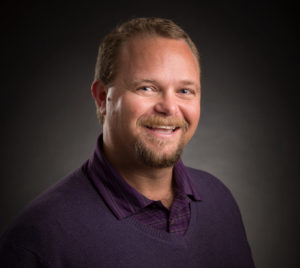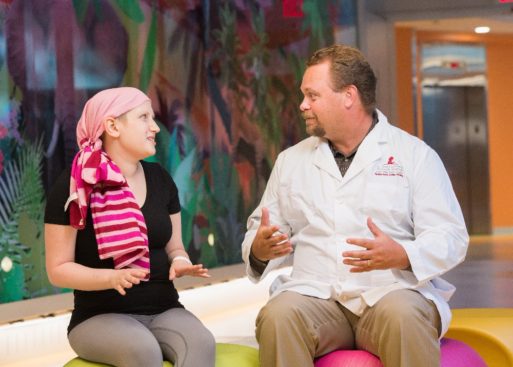Today SevenPonds speaks with Dr. Justin Baker, M.D., Faculty Chief of the Division of Quality of Life and Palliative Care at St. Jude’s Children’s Research Hospital in Memphis, Tennessee. Originally trained as a pediatric oncologist, Dr. Baker later transitioned to pediatric palliative care and helped establish the first pediatric palliative care team at St. Jude’s. Dr. Baker is also the director of the St. Jude’s Pediatric Oncology/Hematology fellowship program and continues to treat patients as an attending physician on both the Oncology and Quality of Life services at St. Jude’s.
Editor’s note: This interview has been edited for length and clarity.

Credit: St. Jude’s Children’s Research Hospital
Kathleen Clohessy: I understand that St. Jude’s Quality of Life Service has a bereaved parents group. Can you tell me about that?
Dr. Justin Baker: I’d be happy to. The program started back in 2010-2011 when the palliative care team sought the input of 10 to 15 bereaved parents to help guide the St. Jude’s staff in providing more compassionate care to the families we treat. Those initial meetings were incredibly successful, so we formed a steering committee which developed an 8-point plan for involving bereaved families in the research and education we were doing around pediatric palliative care.
Kathleen: That’s quite an innovative idea. Did you meet with any resistance from administrators or staff?
Dr. Baker: Oh yes! But then a group of bereaved moms met with our CEO. After speaking with them, he became very supportive of the idea. Today, almost seven years later, we have a very robust group of parents who run our bereaved parent mentoring program and are an integral part of the the palliative care team. They also help train our medical and nursing staff in the principles of compassionate, holistic palliative care.
Kathleen: How did you prepare bereaved parents for their roles? I imagine even the most enthusiastic parents needed some guidance and training before taking on such a challenging responsibility.
Dr. Baker: We enlisted the help of a psychologist who worked with a core group of about 30 bereaved parents to help them develop their coaching and communication skills. Most of the parents were already very committed to helping and very articulate about the kind of support they wished they had when their child was dying or in the aftermath of their death. Their energy drove the program — we just facilitated it.
Kathleen: What is St. Jude’s Day of Remembrance?
The Day of Remembrance is a workshop for bereaved parents sponsored every year by St. Jude’s. It represents an incredible effort by over 400 people, including bereaved parents, staff and volunteers who help organize and coordinate the event. They also provide travel funds so that parents from all over the country can attend.
Kathleen: What a wonderful gift for everyone involved. I imagine supporting others through the loss of a child helps bereaved parents find meaning in their own loss.
Dr. Baker: Yes, it can. Connecting on that level with others who are struggling with the loss of a child creates a cycle of caring that supports both the mentors and the newly bereaved. Most of the parents who participate in the program say that it helps ease their pain to know that they are making a positive difference in the lives of others. And they are very grateful for the opportunity to give back.

Credit: St. Jude’s Children’s Research Hospital
Kathleen: I think I recall reading that the bereaved parents group also participated in the Pediatric Palliative Care Symposium that St. Jude’s hosted last year. Is that correct?
Dr. Baker: Yes it is! Not only did the bereaved parents group help plan the program, but they also conducted interactive role-playing sessions with those attending the symposium to help them get better at delivering difficult news.
Kathleen: Shifting gears a bit, can you talk a little bit about the challenges you and your staff face in caring for children and families who have so many complex needs?
Dr. Baker: That’s a very good question. I think one of the biggest barriers we face is our inability to meet all of the needs of everyone we treat. St. Jude’s has the largest child-life service per capita in the world, and our Quality of Life service employs a large staff. But we still can’t do it all.
We have end-of-life care down. We can do that consistently and do it well. But we haven’t generalized the principles of palliative care to that degree yet. We’re working on two or three different models right now. It’s a challenge for all of us.
Kathleen: Do you see much burn out in your staff?
Dr. Baker: Well, there’s no denying that this is really hard work. And we all probably suffer from compassion fatigue at some point. But we have a lot of incredible team members, so when one of us is feeling down, there’s usually someone to support us through that rough patch, or pick up some slack for a while. And St. Jude’s does a lot to support us, too.
Kathleen: Thank you Dr. Baker for sharing this great information about the pediatric palliative care program at St. Jude’s. I really appreciate your taking the time to speak with me today.
Dr. Baker: You’re very welcome.
Did you miss part one of our interview with Justin Baker? If so, you can read it here.

 How Do Bereaved Parents Contribute to Pediatric Palliative Care?
How Do Bereaved Parents Contribute to Pediatric Palliative Care?


 First the Wealth Gap, Now the U.S. Has a Growing Health Gap
First the Wealth Gap, Now the U.S. Has a Growing Health Gap

 Our Annual Seven Holiday Gifts for Someone Who Is Grieving, 2024 Edition
Our Annual Seven Holiday Gifts for Someone Who Is Grieving, 2024 Edition














